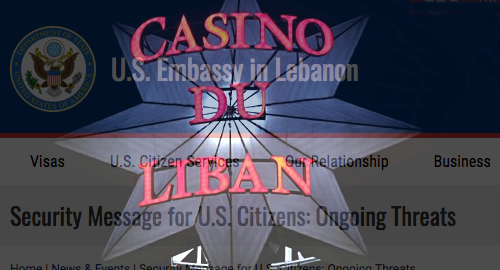 The US Embassy in Lebanon has warned staff not to patronize Beirut’s Casino du Liban due to unspecified threats.
The US Embassy in Lebanon has warned staff not to patronize Beirut’s Casino du Liban due to unspecified threats.
On Thursday, the US Embassy in Beirut issued a statement saying that it has “barred any movement of US government staff” to the Casino du Liban in Jounieh “due to ongoing threats to locations” including the nation’s only licensed gambling venue.
As one might expect, the warning avoided mentioning any specific information on why it had issued its statement. The US State Department has long issued a travel warning to US citizens to avoid traveling to Lebanon “because of the threats of terrorism, armed clashes, kidnapping and outbreaks of violence.”
In January 2015, Lebanese security forces confirmed that they had disrupted a planned terror attack at Casino du Liban that was supposed to take place on New Year’s Eve 2014. Terrorists linked to the Al Qaeda-affiliated al-Nusra Front reportedly planned to detonate a car bomb outside the venue’s entrance.
Casino du Liban’s recently appointed CEO Ronald Khoury issued a statement saying Thursday’s warning was a “routine measure that is not exclusively related to Casino du Liban.” But as a precaution, Khoury said the casino had taken steps to ensure cars were prevented from entering the casino grounds.
US diplomats and other ex-pats residing in Lebanon could still digitally patronize Casino du Liban if the casino had made any progress on launching its online gambling site. This January, the casino reportedly launched a public tender for an online gambling technology partner who could handle “all forms of gaming and sports betting” but little progress appears to have been made on this front.
Last week, Khoury told the Daily Star that he remained committed to the launch of the casino’s internet arm, which would be the nation’s only licensed gambling site.
Casino du Liban was issued a 30-year monopoly license in 1996 and the government has taken an ever-larger slice of the property’s revenue. The casino paid 30% tax on revenue over the first 10 years of its license, rising to 40% for years 11-20, and this rate increased to 50% last December until the license expires in 2026.
In a recent interview with Hospitality News Mag, Khouri said the casino was negotiating a 30-year extension of its license, and seeking some relief from this 50% tax rate plays a key role in these negotiations with Lebanon’s government.
But Khouri lamented the fact that, while his casino is supposed to have a monopoly, “there are several small shops for poker and other such activities” currently doing business in Lebanon. Khouri suggested the government either close these shops or bring Casino du Liban’s tax burden in line with what these rogue operators pay.
Despite their alleged illegality, Khouri said the shops pay the government around LBP 1m (US $663) annually for each slot machine on their premises. Khouri estimates that if Casino du Liban’s 600 slots paid this same rate, its tax burden would shrink from $40m to just $400k.
Other steps Khouri has taken to modernize Casino du Liban’s approach including banning loan sharks from the premises, modernizing the gaming options and expanding entertainment, restaurant and bar facilities. Longer term, Khouri hopes to add a new hotel with “50 private chalets” connected to the casino by tunnels and bridges in the hope of attracting more VIP gamblers.